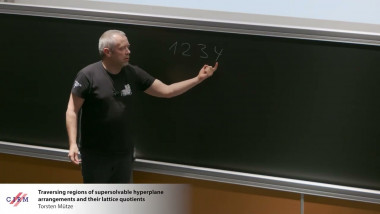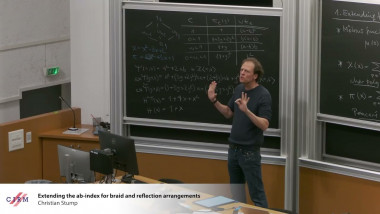
Traversing regions of supersolvable hyperplane arrangements and their lattice quotients
De Torsten Mütze

Extending the ab-index for braid and reflection arrangements
De Christian Stump
Apparaît dans la collection : Combinatorics and Arithmetic for Physics : Special Days
Multitudinous combinatorial structures are counted by generating functions satisfying a composition scheme $F(z)=G(H(z))$.
The corresponding asymptotic analysis becomes challenging when this scheme is critical
(i.e., $G$ and~$H$ are simultaneously singular).
The singular exponents appearing in the Puiseux expansions of $G$ and $H$ then dictate the asymptotics.
Motivated by many examples (random mappings, planar maps, directed lattice paths), we consider a natural extension of this scheme, namely $F(z,u)=G(u H(z))M(z)$.
We also consider a variant of this scheme, which allows us to analyse the number of $H$-components of a given size in~$F$.
These two models lead to a rich world of limit laws, involving Mittag-Leffler distributions, stable distributions...
We prove (double) phase transitions, additionally involving Boltzmann and mixed Poisson distributions, with a unified explanation of the associated thresholds. We explain why and when phase transitions involving a window of size $n^{1/3}$ are universal.
Applications are presented for random walks, trees (supertrees of trees, increasingly labelled trees, preferential attachment trees), and for some extension of works of Flajolet (on the Airy distribution for planar maps), of Pitman (on the Chinese restaurant process), of Janson (on triangular P\'olya urns) ...
Joint work with Markus Kuba and Michael Wallner.
